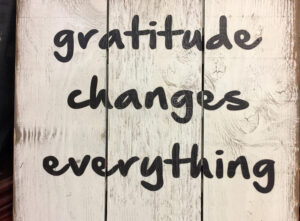Thalia Kostopoulou DDS, MSc, Healthcare- Mentor
During life upheavals -crises, pandemics, trauma- we need an anchor we can lean to, so we can hold into it and regain our inner back.
What is it? This anchor is nothing but our core values and anything that gives us strength and joy. In other words, all those things we are grateful for in our lives.
Gratitude means valuing, appreciating and be thankful for what we got.
Every single time we recognize the valuable things in life, we appreciate them even more.
We should be grateful even for the obvious, for every thing we take for granted, and not wait to lose it in order to appreciate it. Let’s take for example meeting with a friend out on the street and hugging each other. How important were to us instances like this before the pandemic? We shouldn’t wait to be deprived of the obvious before we appreciate it. Let’s appreciate it while being in our lives, instead.
AsAnton Bizzel MD puts it: : “ Do not wait for the holidays to feel gratitude. Think about all those things in life you are grateful for.”
In 2005, Martin Seligman, founder of the field of Positive Psychology in America, and his colleagues demonstrated that those who focus on reviewing the positive events in their lives and express feelings of gratitude towards them experience more joy, are more active socially and energetic.
We cannot always change the circumstances in our lives but we can always decide the way we view them, and how they let them affect us. The ancient Greek philosopher Epicurus proclaimedthat it is not the events themselves that trouble us, but the way we see them.
People who express gratitude in their lives tend to be kinder, have more empathy, are more spiritual and forgiving, and care less about material possessions, thanks to the presence of fulfillment and meaning in their lives.
Gratitude enables us to pay attention to the bigger picture and focus on what’s important in life, thus giving it meaning, and bringing us all sorts of riches.
This feeling also promotes our self-worth and esteem. At the same time, those who express gratitude seem to have much better relationships with their social circle, leading to greater enjoyment of life. Και αυτό οδηγεί σε μεγαλύτερη απόλαυση της ζωής.
Indeed, expressing gratitude is one of the main sources of joy, as we consciously take notice of our resources, appreciate our positive experiences and enhance their positive impact on our lives.
Άλλο στοιχείο που δίνουν απόλαυση κατά τους Βryant και Veroff (2007), είναι η ευχαρίστηση για πράγματα που μας κάνουν να νιώθουμε περήφανοι. Being impressed by things that fill us with awe, as well as physical pleasures, bring also joy. This sort of pleasure, of course, is usually much shorter-lived than mental pleasures.
Gratitude brings joy to life because it enhances appreciation for the positive events of life. It makes us place importance and to value things we usually take for granted or pass over as ordinary.
Whenever we’re in a state of gratitude and feel truly happy for what we have in our lives, we go through feelings of fulfillment, contentment and joy.
Gratitude also seems to be an antidote for anxiety under any circumstance. Constant complaining raises cortisol levels up, because we turn our focus on bad luck, possible threats, and hardship, resulting in high levels of stress and health deterioration.
On the other hand, the positive effects of gratitude on health are undeniable and well scientifically documented. It ensures the much sought-after ideal balance between heart and cognition, and induces body’s homeostasis as a whole, predominantly the nervous and hormonal systems, which influence each other.
People with a tendency to think positively and express gratitude for their lives experience lower levels of stress and therefore have lower blood pressure, fewer heart-related issues, posses stronger immunity and achieve better well-being.
At the same time , several studies demonstrate the tight link between gratitude and balanced mental and spiritual states.
Research shows that the prefrontal lobe of those who cultivate gratitude in their lives undergoes changes that make it easier to feel gratitude in future situations. This comes naturally in accordance to the scientific knowledge of brain’s neuroplasticity, i.e. the new pathways, the new neuroconnections built in our brains based on our daily habits.
Expressing gratitude does not mean resting on our achievements or possessions, or settling for less, or resorting to fatalism.
Far from it! Focusing on the positive, a prerequisite for gratitude, brings excitement and determination for life, alertness and a creative mood, all enabling us to fulfill our goals. And of course, all this keeps depression at bay.
Certain individuals innately view life as a whole with acceptance and gratitude, even when faced with obstacles and difficult situations. They accept the existence of difficulties for all, without wondering why specific things happen to themselves. Instead, their belief is that anything can happen to anyone and embrace whatever comes their way with acceptance. Their main characteristic is resilience, which equips them with the strength necessary to bounce back quickly after adversity.
Familiarity with the process of gratitude eventually leads to evaluating challenging experiences positively, for a number of reasons, namely:
– Difficulties add to our experience,
– Even during hardship, we may find support from those around us,
– We strengthen our bonds with those who stood by us,
– Even the greatest losses have the ability to leave us
with positive lessons.
– because surely all this makes us stronger.
Accepting and welcoming any circumstances in life, without making distinctions between good and bad, encompasses a kindness and a greatness straight from the heart, bypassing rationale altogether. It certainly requires putting trusting in the flow of life and a deep belief that, in the long run, everything happens for a good reason. This maturity of consciousness leads to a lack of demands and the realization that the most important thing in life is living in the present moment.
Being grateful for our lives as a whole ultimately makes us feel beautiful, joyful, and blissful.
In other words, gratitude creates a sense of self-reliance, enabling us to reach our goal of living in a state of abundance and bliss. And what’s more, abundance attracts abundance. When we feel rich and self-reliant, we attract the corresponding states on a material level, as well.
So open up new paths of bliss, gratitude, positive thinking and well-being physically, mentally and spiritually by cultivating gratitude in your life.
This article https://tkhealthmentor.gr/eugnomosini-texnikes-exaskisis/ is a list of techniques that help us adopt gratitude in our everyday lives and reap its benefits.




